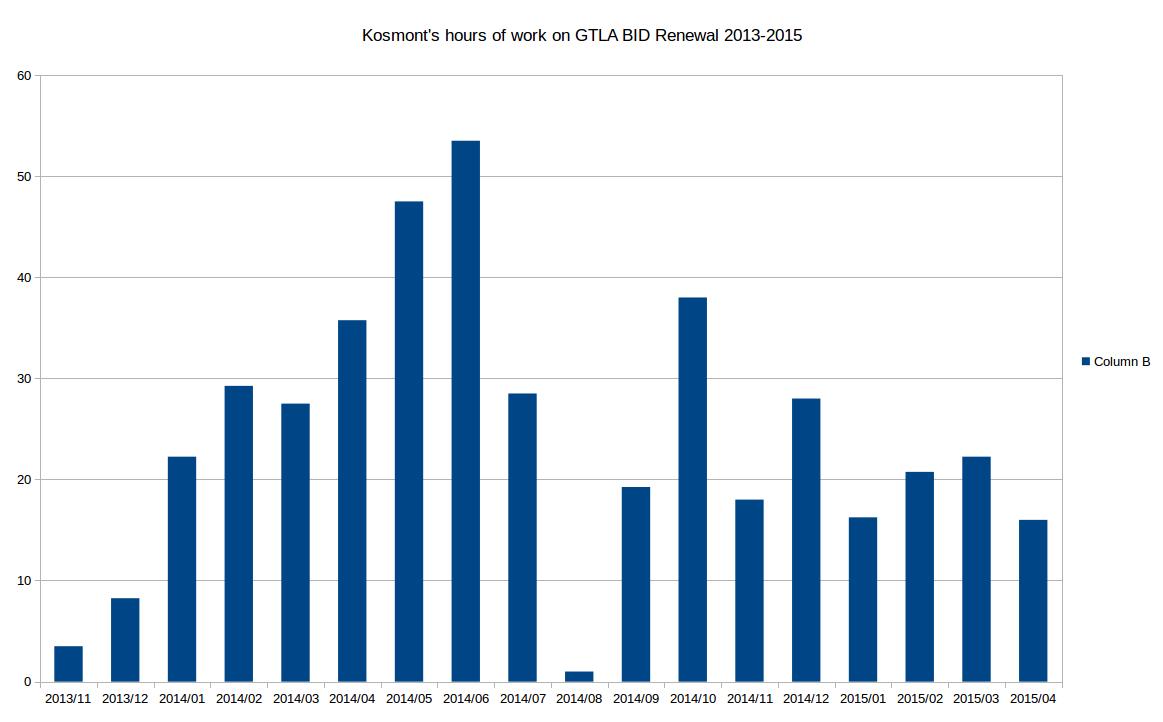
The process of getting a BID established or renewed, it turns out, looks an awful lot like the definition of lobbying activity to be found at LAMC §48.02, which is essentially preparing information and discussing it with City officials as part of influencing the passage of municipal legislation. The law requires anyone who’s paid for thirty or more hours of this over three consecutive months to register as a lobbyist, and it’s generally extremely hard to prove that someone’s met this criterion. You may, e.g., recall that earlier this year, in order to make a reasonably convincing case that Venice Beach BID consultant Tara Devine had passed this threshold, I spent months piecing together more than a hundred pages of evidence regarding her BID consultancy work.
But recently it’s occurred to me that these consultants have contracts with the BIDs they service, and that at least in the case of BID renewals, the contracts will be accessible via the Public Records Act.2 The contracts will contain some information about how much time the consultants spend on the project, and thus should be useful as evidence in reporting consultants to the Ethics Commission for lobbying without a license.
The project started to produce results at the end of February, when the incomparable Laurie Hughes of the Gateway to LA BID supplied me with her BID’s contracts with Larry Kosmont, who was handling the renewal process.3 Well, late last week, Laurie Hughes gave me an absolutely essential set of documents, consisting of detailed monthly invoices from Kosmont to the BID during the 15+ month renewal process. These are fascinating,4 containing as they do detailed inventories of every individual task involved in the renewal process broken down into fifteen minute billing increments. Turn the page for more descriptions, discussion, and speculations.

Also, it’s interesting to compare the last three months of Kosmont’s work, just before the final materials were submitted to the clerk, with the last three months of Tara Devine’s work on the Venice Beach BID. Of course, those were the exact months I considered in my complaint to the CEC against Devine. Because I was working there exclusively with emails, it was like pulling teeth to get to a plausible estimate of more than 30 hours of work.8 However, the invoices for Kosmont show a total of 59 hours in the last three months. How much easier would that have made my investigation? Of course, BID creation is slightly different from BID renewal, but it seems to be harder rather than easier, suggesting that it would take even more time.
Such considerations show exactly why BID consultants’ invoices have the potential to be such dynamite. And that, in turn, explains why other up-for-renewal BIDs I’ve worked on in the last few months have been uniformly reluctant to hand them over. First of all, there’s the Historic Core BID. I’ve been trying to get records pertaining to their renewal out of batty little fusspot Blair Besten since February with no luck.9 And don’t even get me started on the surreal contortions that the South Park BID is going through to keep this material out of my hands.10 For instance, twisted little pipsqueak Katie Kiefer actually claimed that a request for all invoices from BID consultant Tara Devine11 was not sufficiently focused to allow her to identify responsive records.12
And even the usually ultra-cooperative, always ultra-competent, Rena Leddy of the Fashion District BID is holding back on this one. She’s given me the FDBID’s contract with Urban Place Consulting, but blacked out their hourly rates and the schedule of hours that they expect to spend on each task.13 She’s also given me only unitemized invoices, even though the contract calls for UPC to submit itemized ones to the BID. It’s not clear at this point whether she’s withholding itemized ones or if UPC just isn’t following the terms of the contract.
The moral of that story is that it’s at least possible that some BIDs think that this contract/invoice based strategy is a good one, otherwise why are they so resistant to handing over the goods? So that’s what’s currently up with the campaign to get BID consultants to register as lobbyists. More news when I have it!
Image of Larry Kosmont is a transformative reuse of this image from his official staff bio and we thank you very much! The chart is probably not subject to copyright, but just in case it is I hereby release it into the public domain!
- These are the non-profit corporations with which the City contracts to administer BIDs. They are required by the Streets and Highways Code at §36612.
- It’s an open question as to whether BIDs are so subject before they’re established. It’s important to remember that technically it’s the property owners’ association that’s subject to CPRA rather than the BID itself. The way the definition in the law is written, it seems to say that the POA is only subject to CPRA once they’ve signed a contract with the City. So there are a few important questions to be answered. First, is a POA subject to CPRA before they sign the contract? For instance, the Venice Beach BID has not yet signed its contract with the City, and also they are completely ignoring a CPRA request I made in February. Various other matters have prevented me from discussing this with lawyers so far, and it’s likely that they’ll have signed before I get around to it. The next, and much more important, question, is whether, once the POA signs a contract with the City, its records from before the contract was signed become subject to CPRA. In answer to a CPRA request I made of her BID in February, Laurie Sale of the Palisades BID told me that they weren’t. She’s famous, though, for not just not being able to read the CPRA, but not being able to read period, so no one’s taking her opinion as dispositive. In fact, if the BID doesn’t get someone sane to handle CPRA requests, like e.g. the lawyer they evidently hired, this is likely to develop into a case that tests the proposition, among a long list of other matters, that these pre-establishment records are subject to CPRA. CPRA covers records that are in the possession or a local agency and which relate to the operation of the local agency. It says nothing about when they were created. In any case, this is all highly tangential and speculative at this point, but interesting. You’ll be hearing more about this, but it won’t be for many months to come.
- Laurie Hughes has informed me that Kosmont doesn’t ordinarily do BID consulting, but he does it for the GTLA BID because he played a role in getting it established. Note, by the way, that Kosmont is registered as a lobbyist, and he even disclosed his renewal work to the City on the required forms.
- If you’re as immersed in BID-geekery as I am, anyway. Maybe not so objectively fascinating.
- On the off chance that someone may find it useful, here is the rudimentary spreadsheet I made to analyze the hours per month.
- Due to the pigeonhole principle, the details of which I’m skipping, but if you’re interested, drop me a line.
- I’m sorry not to link to proof of this statement. I have a record that shows the Clerk’s suggested schedule, but I can’t lay my hands on it at this moment. I will publish it soonest.
- You can see a tabular summary of the calculations here or, if you want the gritty details, the entire complaint is here.
- With Blair Besten, of course, it’s not actually possible to tell if she’s being obstructionist with a reason or just because it’s in her nature like that freaking scorpion, or even if it’s just free-floating hostility, weirdness, and incompetence.
- They’re next in line for some pressure, so stay tuned.
- Yes, they too are using Tara Devine, so the information is especially desirable in this case.
- This is happening because they hired downtown bigshot business lawyers Bradley & Gmelich to advise them on my CPRA requests. B&G may be many things, but competent at CPRA they are not. However, the evidence suggests that they’re competent at setting up a situation in which their client is going to have to spend an awful lot on legal fees, and, who knows, perhaps that’s their actual goal.
- Presently she’s claiming that UPC’s hourly rate is a freaking trade secret and thereby exempt from CPRA. That’s not a winning argument, and I’ll be writing on this much more in the future when the situation has reached a more settled state than it is at right now. I’m also holding off on publishing the consultant material I do have for the FDBID until things are more settled. If you need to see it right away email me and I will send you copies.
